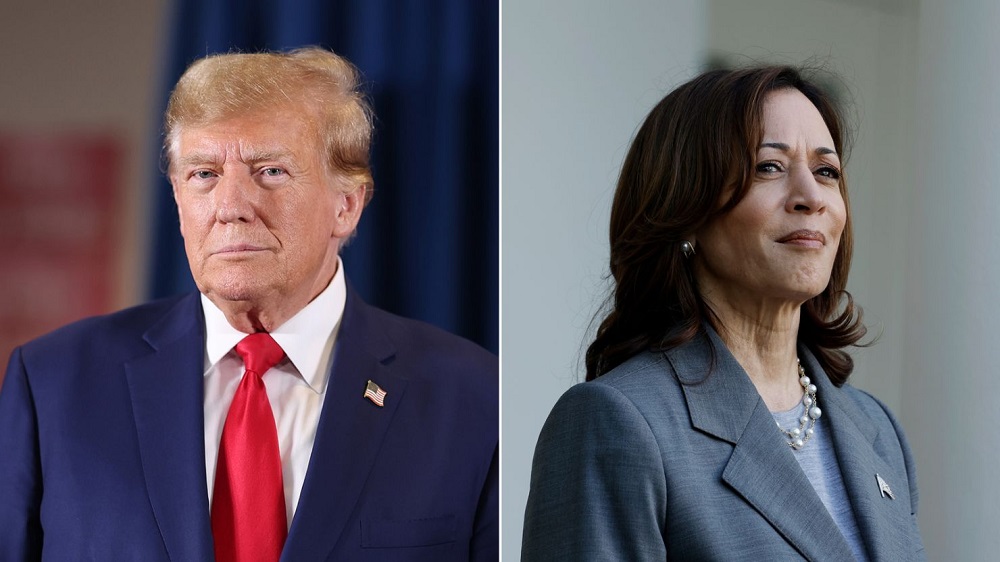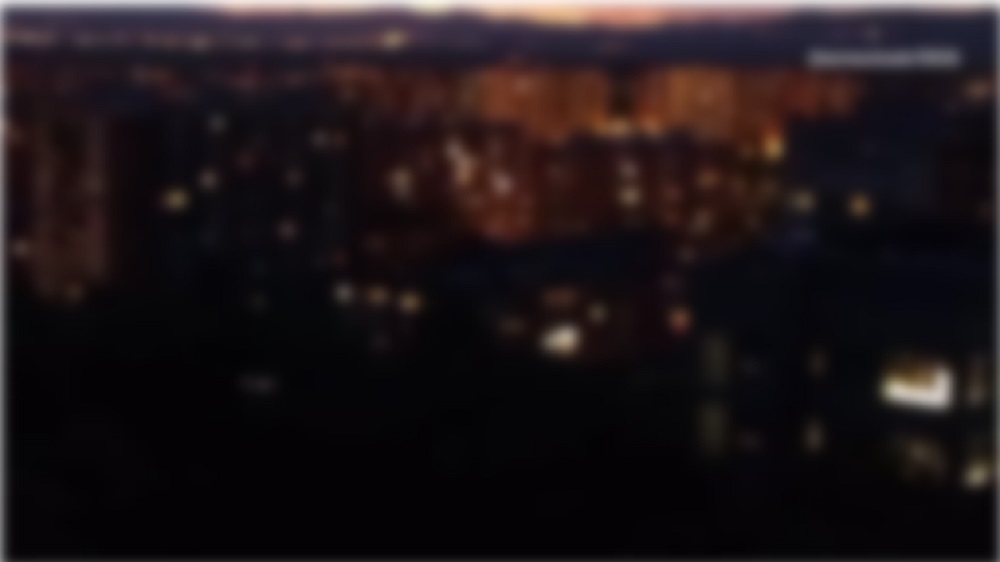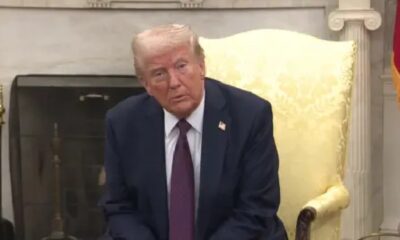Foreign
Trump bounces back on stage as VP Harris soar in poll

Donald Trump and Kamala Harris are holding dueling campaign stops in the crucial battleground state of Pennsylvania this weekend, as new polling shows the US vice president making major gains ahead of her big moment at next week’s Democratic National Convention.
Trump will hold a rally in the small town of Wilkes-Barre on Saturday, while Harris is taking her tour bus on several stops around Pittsburgh on Sunday before heading to the convention in Chicago.
The momentum in the White House race has shifted dramatically since President Joe Biden abruptly pulled out on July 21, with Harris’s whirlwind entry energizing the Democratic Party base.
A survey by the New York Times and Siena College published Saturday had Harris storming back into contention in four critical battleground states that Trump had looked set to win comfortably against Biden.
The Republican has struggled to find an effective counter to the Harris surge, and the new poll will likely trigger further consternation in his campaign team, with the vice president now ahead in Arizona and North Carolina, and getting closer in Nevada and Georgia.
The stakes will be high for Trump to find some fresh impetus at Saturday’s public rally, after a series of distinctly low-energy events held at his Florida resort home and a golf club he owns in New Jersey.
The Trump campaign’s statements have focused on issues like immigration and inflation, but the candidate himself has spent large chunks of recent speeches launching personal attacks against Harris, which may not play well with the undecided and independent voters he needs to win on November 5.
“Hard-working Americans are suffering because of the Harris-Biden administration’s dangerously liberal policies,” a campaign statement said ahead of the Wilkes-Barre rally.
“Prices are excruciatingly high, cost of living has soared, crime has skyrocketed, and illegal immigrants are pouring into our country,” it said, although a recent crackdown on the Mexico border has stemmed much of the flow of undocumented workers and asylum seekers.
Whether Trump can stay on that message is another matter.
Speaking to reporters on Thursday, Trump argued that he felt perfectly “entitled” to keep up his personal attacks on Harris — the first Black woman nominee of a major party in history.
His remarks have included questioning Harris’s intelligence, attacking her racial identity and branding her a “communist.”
With polls showing the head-to-head race very close, it is the swing states — especially Pennsylvania — that will decide the final result under the US electoral college system.
Trump lost the state by a narrow margin against Biden in 2020 but has strong support in rural areas and small towns.
A separate New York Times/Siena poll last week showed Harris narrowly ahead in Pennsylvania and the two other northern battleground states of Michigan and Wisconsin.
The vice president will be hoping to keep the poll momentum going as she heads into the Chicago convention, which will feature three days of speeches from party leaders, including Biden and former president Barack Obama.
Harris will round out the event on Thursday evening, with her own speech to formally accept the party nomination.
– Fight over economy –
With election day rapidly approaching, Harris is trying to distance herself from unpopular Biden policies, while getting ahead of Trump’s attempts to brand her a liberal extremist.
The past week has seen the two sides home in on voters’ worries about the economy.
Trump hammered Harris on Thursday, saying she has a “very strong communist lean” that would bring the “death of the American dream.”
On Friday, Harris held an event in North Carolina to unveil a series of proposals to ease the burden of post-Covid pandemic inflation.
She noted that the US economy was booming while conceding that “many Americans don’t yet feel that progress in their daily lives.”
“Donald Trump fights for billionaires and large corporations,” she said. “I will fight to give money back to working- and middle-class Americans.”
AFP
Foreign
Burkina Faso, Mali, Niger seek access to Atlantic through Morocco

Foreign ministers of military-ruled Sahel states of Burkina Faso, Mali and Niger said on Monday they endorse an initiative offering them access to global trade through Morocco’s Atlantic ports, Reuters reported.
The foreign ministers expressed their countries’ position during a meeting with Morocco’s King Mohammed VI in Rabat, it said.
The West African nations, run by military leaders who took power in coups in recent years, withdrew from the regional grouping ECOWAS last year and formed an alliance known as the Confederation of Sahel States (AES).
Morocco, a major investor in West Africa’s financial and agricultural sectors, announced its trade access initiative in November 2023, after ECOWAS imposed trade restrictions on the three states.
The initiative is conducive to “diversifying our access to the sea,” Mali’s foreign minister Abdoulaye Diop told state media.
The meeting “is part of the strong and longstanding relations of the Kingdom with the three brotherly countries of the Alliance of Sahel States,” Morocco’s news agency said.
The visit takes place as relations between the AES and Algeria, Morocco’s regional rival, deteriorate.
Algeria has cut ties with Morocco and backs the Polisario Front which seeks an independent state in Western Sahara, a territory Morocco considers its own and where it is building a port worth $1 billion.
The new AES grouping expelled French and other Western forces and turned towards Russia for military support.
In December, Morocco mediated the release of four French spies held in Burkina Faso, five months after Paris recognised Rabat’s sovereignty over Western Sahara.
Foreign
Massive power outage hits Spain, Portugal

A massive power outage paralyzed Spain and Portugal on Monday in an incident with no immediate explanation.
“It’s best to not speculate. We will know the causes soon. We are not discarding any hypothesis, but right now, we just focus on what’s most important: returning electricity to our homes,” Spanish Prime Minister Pedro Sánchez said at a news conference Monday.
The stoppage, which occurred about 12:30 p.m. Madrid time, caused chaos across the Iberian Peninsula and showed the vulnerability of Europe’s electrical grid — even on days without extreme weather or spiking demand.
Trains stopped running. Hospitals canceled surgeries, according to news agencies, and depended on backup generators. Business ground to a halt as machines were unable to process credit card transactions. The outage even suspended several Madrid Open tennis matches, with photos showing a court with nonfunctioning scoreboards and darkened stands. Sánchez urged citizens to restrict cellphone use and to call emergency dispatchers only “when it is really necessary.”
By about 5:30 p.m. Madrid time, Red Eléctrica, the corporation that operates Spain’s electricity grid, said some power had been restored across corners of the peninsula, including parts of Catalonia, the Basque Country and Andalusia. About two hours later, the utility provider said more than a fifth of the peninsula’s power had been recovered. Full recovery may take up to 10 hours, Red Eléctrica told Spanish news outlets, which means the country’s power could be restored some time late Monday.
“Causes are being analyzed, and all resources are being dedicated to addressing the issue,” Red Eléctrica said in a statement.
More than 50 million people live on the Iberian Peninsula, but authorities did not provide an immediate estimate for the number of people affected by the outage. Portugal’s national grid operator described it as a “massive cut” in electricity supply across the peninsula. Data from Red Eléctrica showed a sudden plunge in electricity demand from about 27,000 megawatts to less than 13,000. Levels remained abnormally low two hours later.
Spain’s Energy Ministry said in a statement that Sara Aagesen, a deputy prime minister, visited the Red Eléctrica control center to “learn about the situation firsthand and monitor the incident.”
“All necessary measures will be put in place to restore normality as quickly as possible,” the statement said.
Prime Minister Sánchez also held a meeting at the control center, with Aagesen and several other ministers present, the Spanish newspaper El País reported, and Spain’s National Security Council called a meeting to address the outage.
Portugal’s Lusa News Agency said the country’s cybersecurity center had seen no evidence so far that the blackout stemmed from a cyberattack. Separately, the Reuters news agency quoted unnamed officials as saying a cyberattack had not been ruled out.
The Spanish grid also connects with Morocco, France, Andorra and Portugal. Spain and France experienced a major blackout on July 24, 2021, but it lasted less than an hour.
Previous power outages in Europe have been caused by technical problems, lightning strikes and damaged cables. In 2003, Italy faced a huge blackout because a tree was too close to a power line, resulting in a flashover, or a jump of electricity from the line to vegetation.
Foreign
Putin announces three-day Russian ceasefire in Ukraine from 8 May

Russian President Vladimir Putin has announced a temporary ceasefire for the war in Ukraine.
The Kremlin said the ceasefire would run from the morning of 8 May until 11 May – which coincides with victory celebrations to mark the end of World War Two.
In response, Ukraine’s Foreign Minister Andrii Sybiha called for an immediate ceasefire lasting “at least 30 days”.
While US President Donald Trump, who has been attempting to broker a truce between the two sides, said he wants to see a permanent ceasefire, the White House said.
The Kremlin announced a similar, 30-hour truce over Easter, but while both sides reported a dip in fighting, they accused each other of hundreds of violations.
Ceasefires have been attempted more than 20 times in Ukraine – all of them failed eventually, and some within minutes of going into effect.
The most recent one, over Easter, was very limited in scope and only resulted in a slight reduction in fighting, with both sides accusing each other of violating the truce.
In a statement on Monday, the Kremlin said Putin declared the ceasefire “based on humanitarian considerations”.
A translation of the statement said: “Russia believes that the Ukrainian side should follow this example.
“In the event of violations of the ceasefire by the Ukrainian side, the Armed Forces of the Russian Federation will give an adequate and effective response.
“The Russian side once again declares its readiness for peace talks without preconditions, aimed at eliminating the root causes of the Ukrainian crisis, and constructive interaction with international partners.”
Following its release, Ukrainian Foreign Minister Sybiha said: “If Russia truly wants peace, it must cease fire immediately.”
“Why wait until May 8th?” he wrote on X. “If the fire can be ceased now and since any date for 30 days—so it is real, not just for a parade.”
He said Ukraine is ready to support a “lasting, durable, and full ceasefire. And this is what we are constantly proposing, for at least 30 days”.
White House press secretary Karoline Leavitt said Trump was growing “frustrated with leaders of both countries”.
“He wants to see a permanent ceasefire.
“I understand Vladimir Putin this morning offered a temporary ceasefire. The president has made it clear he wants to see a permanent ceasefire first to stop the killing, stop the bloodshed.”
The latest announcement comes during what the US has described as a “very critical” week for Russia-Ukraine peace talks.
Washington has been trying to broker a deal between the two sides, but the Donald Trump administration has threatened to pull out if they do not see progress.
Putin is keen to create the impression that Russia is serious about seeking peace – and he is keen for Trump to hear that message given Ukraine has accepted Washington’s proposal for a more lasting 30-day ceasefire.
It comes after the US president expressed annoyance with Russia’s continued attacks on Ukraine.
Russia launched a full-scale invasion of Ukraine on 24 February 2022, and currently controls about 20% Ukraine’s territory, including the southern Crimea peninsula annexed by Moscow in 2014.
It is estimated that hundreds of thousands of people – the vast majority of them soldiers – have been killed or injured on all sides since 2022.
-

 Metro23 hours ago
Metro23 hours agoGunmen storm University of Benin teaching hospital, kill doctor
-

 Metro24 hours ago
Metro24 hours agoFCTA destroys 601 motorbikes over violations
-

 News15 hours ago
News15 hours agoAlleged money laundering: EFCC produces Aisha Achimugu in court
-

 News24 hours ago
News24 hours agoJust in: FG declares tomorrow public holiday
-

 News17 hours ago
News17 hours agoJUST IN: Major General Paul Ufuoma Omu Rtd, dies at 84
-

 News17 hours ago
News17 hours agoTinubu hails Dangote’s World Bank appointment
-

 News19 hours ago
News19 hours agoSAD! Professor’s son takes own life inside varsity staff quarters
-

 News10 hours ago
News10 hours agoHon. Dennis Agbo Resigns From Labour Party


















